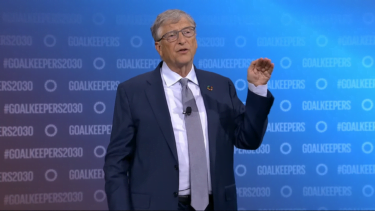Since 2018, Germany has been funding research and development projects on artificial intelligence with five billion euros. The aim of the AI strategy is to make Germany an attractive international destination for AI professionals by 2025. But what exactly is being funded, and with what success? An overview.
To improve international awareness and strengthen Germany in AI research, the German government gave the go-ahead for the National Strategy for Artificial Intelligence (AI strategy for short) in November 2018. With a total of five billion euros, the AI strategy aims to promote AI research projects and bring innovative developments to German small and medium-sized enterprises by 2025.
Federal policy measures for an "AI made in Germany"
The AI strategy pursues the goal of increasing the visibility of Germany internationally and thus strengthening the competitiveness of German AI companies. Germany is to become more attractive as a location for AI research, development and projects with a concrete application character, also for researchers and employees from abroad.
Artificial intelligence is to be introduced at universities, universities of applied sciences and other educational institutions in order to anchor "AI made in Germany" as a broad-based effort in society and to establish it as an international trademark. European guidelines will be implemented analogously to "AI made in Europe". Under the guideline of ensuring responsible development and public welfare-oriented application of AI systems, priority will be given to establishing AI ecosystems with a holistic approach.
The measures are spread across twelve different fields of action, for example, pandemic control, environmental and climate protection, and general sustainability and health projects. Projects for national and international networking of various initiatives are also funded. The Federal Ministry of Education and Research (BMBF) is responsible for promoting Germany as a location for research and science.
Wissenstransfer an Industrie und Gesellschaft
The measures of the Federal Ministry of Education and Research are primarily intended to train more AI specialists, establish high-performance and visible research structures, and promote international networking.
The BMBF also supports the provision of state-of-the-art AI and computing infrastructures at an internationally competitive level and the application of research results in areas relevant to society. The funding measure KI4KMU is intended to boost the establishment and development of AI-based business models in small and medium-sized enterprises (SMEs).
The German Research Center for Artificial Intelligence (DFKI), founded in 1988 as a competence center with locations in several German cities, also receives significant support from the BMBF. The "Learning Systems Platform" launched by the BMBF in 2017 brings together expertise from science, industry, and society. Examples of practical projects supported by the BMBF include AI systems in offshore wind turbines that can be used to generate green electricity or artificial intelligence-based hand prostheses that can be intuitively controlled by thought.
Other funding programs initiated by the BMBF relate to machine learning (ML) methods, the establishment of AI laboratories, the promotion of young scientists, and application-oriented projects. The communication of AI topics to civil society - for example in associations and clubs - is also supported to create a society-oriented discourse and networking opportunities between a wide variety of actors.
AI support programs in educational institutions
In the education sector, many of the measures are being implemented through the federal-state program "AI in Higher Education" in cooperation with the states. AI labs have been set up at numerous universities and colleges to promote the advancement of young AI talent. The funding line KI-Nachwuchs@FH, for example, is aimed at universities of applied sciences.
Some funding programs also support specific research projects of individual scientists, professors, or AI working groups. DAAD Schools of Excellence for AI and International Future Labs for AI are also designed to promote international networking and academic research in the field of AI.
In addition, the German Research Foundation (DFG) has launched the funding initiative "Artificial Intelligence" to support AI-oriented projects at universities and other research institutions between 2020 and 2022 and to cooperate with partner organizations.
Many universities and colleges have included AI courses in their curricula. Nationwide, there are around 200 degree programs with a focus on artificial intelligence and another 170 degree programs with a focus on data science. In addition to the technical perspective, the interdisciplinary topic is also covered in ethically, philosophically, and socially oriented courses.
AI strategy with hurdles
As of September 2021, only ten percent of the funds provided by the German government have been drawn down: Of the 3.5 billion euros available in 2019 to 2021 federal budgets and under the Economic Stimulus and Future Pact, it was only 346 million euros. Of this, the Federal Ministry of Economics received around 144 million out of a total of 967 million.
In June 2021, the Federal Environment Ministry even increased its spending on AI projects in environmental and climate protection to 150 million euros by 2025.
The BMBF justifies the low call for funds with the fact that many of the measures run until 2025 and the funds are therefore already committed but not yet spent. Another reason for the reluctance to apply for funding could be bureaucratic hurdles and German skepticism about innovation - despite the high monetary incentives and the potential of artificial intelligence.





